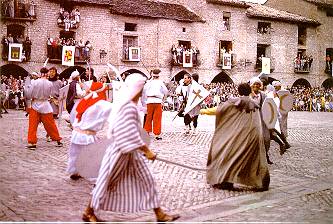| 2. Religion and gender
In this context, the role of religion and religious musical events in modeling genders and/or in providing a space for the expression of gender-roles is worthy of serious consideration. Since religious beliefs are extremely important in shaping a particular view of gender, we should take into account their influence as an element of differentiation among Mediterranean countries, where the three great monotheistic religions originated and developed side by side. Judaism, Islam, and Catholic and Orthodox Christianity are all monotheistic religions, believe in a male God, share a patriarchal view of society, and assign religious power to men. Of course, there are also profound differences among them, and we know that religious conflict, which also involves conflicting views of gender roles (Davis 1993: 94), was one of the most powerful agents of history in the Mediterranean and constitutes a problem still today, especially with regard to the resurgence of Islamic integralism (see the article of Karin van Nieuwkerk in this number of M&A) and other cases of religious intolerance. From a historical point of view, one of the major factors in the shaping of the Mediterranean was the opposition between Christianity and Islam, since both religions aimed at expanding their areas of influence. The fights between Christians and Moors are still represented in Spanish and Italian folk theatre (e.g. Magrini 1992).
On the other hand, communities of the Jewish diaspora and Gypsies had to live for a long time within one of these religious areas and used religion as a means to either maintain their identity or mediate with their neighbors. It goes without saying that, in this complex situation (which is becoming now more and more complex because of the increasing mobility of peoples within the Mediterranean), distinctive views of genders played - and still play - an important role in maintaining the cultural identity of different religious communities. However, one should keep in mind that the different Mediterranean religions are not equally distributed, let alone equally strong, within their own areas of influence and that they do not affect the public opinion on issues related to gender in the same way everywhere. Moreover, it is important to distinguish between beliefs that are upheld and promoted by religious authorities and those belonging to folk religion, the latter being the ritual-religious practices more frequently observed by anthropologists. In the Euro-Mediterranean Christian world it is easy to notice that a big gap often exists between official and folk religions and that the clergy tends to mistrust folk religious practices that have a clear syncretic character and connections with old pre-Christian religions. However, these ritual-religious practices are often the privileged field of action of the women and therefore will be examined in this article, with regard to the Christian Mediterranean world, in an attempt to discover their role in the construction and representation of femininity. |
